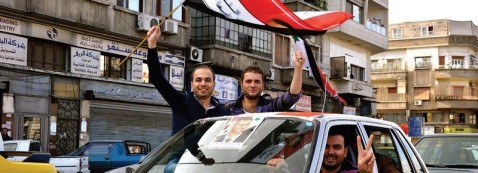The crisis in Syria has reached a critical point as various rebel forces continue to battle the army and militias loyal to President Bashar Assad, with neither side apparently managing to gain the upper hand.
In the past 21 months, tens of thousands have been killed and the UN estimates that the number of Syrian refugees fleeing the conflict is nearing half a million people dispersed between Turkey, Iraq, Jordan, Lebanon and Egypt.
Last week, the Middle East Studies Center and the Department of Political Science invited Bassam Haddad, the director of the Middle East Studies program and assistant professor in the department of public affairs at GeorgeMasson University, to shed light on the situation in Syria.
During his lecture “The Impasse in Syria: Causes and Dynamics of the Uprising,” he argued that the stalemate at the domestic, regional and international levels of the country is the reason behind the impasse in Syria.
“The future of Syria is not good. The infrastructure of Syria is deteriorating and its military power is being compromised,” Hadded told The Caravan. “Whatever Syria could have stood for is also being compromised and this is bad news.”
Haddad thinks that there is no clear end-game in sight, the bad news is for both Syria and the entire region; however, he believes the stalemate is good news for its enemies.
Dania Habel, a Syrian economics student said “I think that at this point we need people to think like this, you can’t be opposed because it would be as if we are not seeing what is on the ground properly. I think he [Haddad] covered that pretty well.”
Haddad thinks that it is very difficult for nations in the Middle East to help Syria at the moment but rather thinks that the focus should be diverted to damage control.
“The cooperation should be for the post-conflict period,” said Haddad “And for now unfortunately most of the Arab countries, in my view, are not qualified to intervene as well as the United States.”
In the lecture, Haddad stressed on the fact that the conflict at the domestic level in Syria remains key, even if it is no longer purely domestic.
Aida Derry, another Syrian and an AUC student believes that Haddad relayed an overall picture of the situation inSyria.
“I thought the lecture was very good without being biased.”
